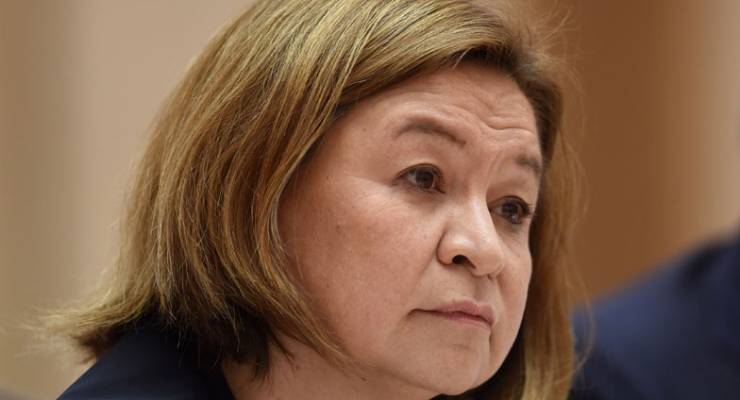
In the annals of ABC’s estimates appearances — from the glory days of David Hill going toe-to-toe with Bronwyn Bishop in the early hours of the morning, through John Faulkner putting Jonathan Shier under the microscope to Eric Abetz devoting hours to accusing the ABC of bias, murder, war crimes, genocide etc — there’s rarely been a less glorious performance from an ABC executive than from one-time journalist Alan Sunderland last night.
It’s unusual for the ABC to unite government and opposition senators, who come to ABC issues from diametrically opposed perspectives, but so it proved last night when Labor’s new senator Kristina Keneally, Deborah O’Neill and WA Liberal Linda Reynolds all gave Sunderland a bollocking for rocking up to hearings with the smoke from the Emma Alberici censorship debacle still hanging in the air, and refusing to answer questions.
An obviously well-briefed Keneally wanted to do a tick-tock on how Alberici’s pieces were edited and published. In particular, she raised some interesting questions about how other ABC staff, rather than Alberici, had headlined and promoted the pieces. She wanted to explore what had happened after it was published and then, in the case of one of the pieces, pulled down after demands from the government. Most of all, she wanted to know what, exactly, the errors were that the ABC claimed to have found in Alberici’s pieces.
Sunderland was having none of it. Talking like a man who’d swallowed a management textbook, Sunderland insisted that his job wasn’t to work out what the piece originally said, how it was edited, what the errors were, or who said what to whom about it — it was instead all about a corporate failure by the ABC, rather than one of individuals, and the importance of getting the internal process right going forward.
Reynolds, coming to the issue from the exact opposite perspective of how the ABC could have allowed the pieces to ever be published at all, was equally gobsmacked that Sunderland’s only response was to shake his head and insist that he wasn’t interested in apportioning blame, responsibility was shared across the ABC.
Sunderland appeared to have confused his job at the ABC, where he is paid to utter managerialist inanities about key learnings, system failure and proactive management, with his role before estimates, which is to answer questions from the committee whether he likes them or not, and whether they complement his preferred handling of an issue or not. Whatever you think of the ABC, it is accountable to taxpayers and parliament; Sunderland seemed to think that didn’t count if it required him to answer questions to do with individual incidents — like what specific errors had been found in Alberici’s pieces. Apparently, no one knew what they were, making it hard to understand exactly how the ABC has got back to the point where it republished the censored piece.
The big risk at the ABC has never been left-wing or right-wing bias — though both can be problematic — but the dominance of managerialist-minded bureaucrats who never have, or have lost, a feel for independent public-interest journalism (a threat exacerbated during the Howard years by the stacking of the ABC board with right-wing activists who knew nothing about broadcasting, thus preventing the board from exercising informed control over management). Now the whole show is run by just such a bureaucrat in Michelle Guthrie, who in response to Keneally rejected the idea that the ABC had “hung Alberici out to dry” — shortly before refusing to express confidence in her. Plainly they use a tumble dryer at the ABC instead.








It really was a remarkable train wreck session for the ABC in estimates last night.
If there was any real justice, it should signal the beginning of the end for both Sunderland and Guthrie.
Classless and clueless.
Agree Paddy.
Looks like the great unravelling of the public service around the country is infecting the ABC; maybe terminal.
It’s fast approaching a back to 2013 moment when all Abbott had to do was promise to undo everything Labor had done. Lead on, Bill.
Incompetent management, hand-picked by an incompetent government.
Bring that election on – every day I awake hoping for a terminal mistake by Turnbull and his motley crew.
Look no further than that photo of a demented Michaeliar Cash in the Guardian today for evidence they have to go to the sin bin.
‘…getting the internal process right going forward.’
When anyone bleats about ‘going forward’ it’s a fair indication they will be either –
a) going nowhere
b) travelling in a well worn circle
“Yes Minister. Life imitating art.”
Guthrie – another “Tuppence Triumph”.
Agred. It seems that they see ‘Yes Minister’ as a training progam, not a comedy program.
Agred? Agreed.
Fortunately for us all there’s a lot more commitment, skill, expertise and integrity in the ABC studios. It’s pity they’re lumbered by these highly paid, weak kneed drop kicks.